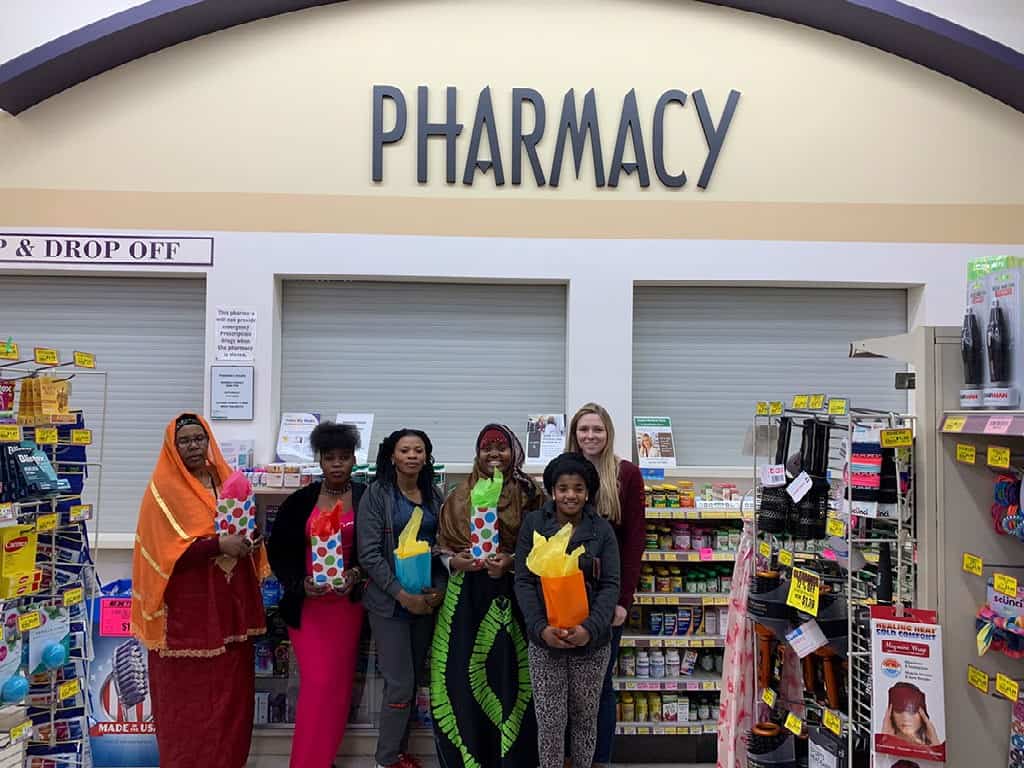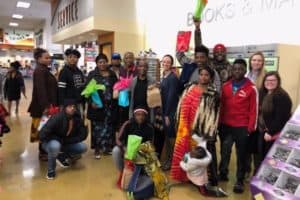UAMS Pharmacy Students Help Refugees Navigate Pharmacies
| As part of resettlement efforts for newly arrived refugees, pharmacy students from the UAMS Northwest Regional Campus recently gave tours of two local pharmacies to refugees in Washington County. Students also provided gift bags of thermometers, toiletries and other basic essentials.
The students worked with Canopy NWA, the only official resettlement agency in Arkansas that is accepting new refugee arrivals, to help explain pharmacies and make a pharmacy feel like a welcome place where limited English speakers are invited to ask questions about medications.
“The primary goal was to let them know how prescriptions work, how over-the-counter medication works, or when to go to the ER, emergent care or their primary care physician,” said Cate Halloran, a third-year pharmacy student who works at Community Pharmacy in Springdale. “They responded well, and several have already gone to the pharmacy for medications and other things.”
More than 30 refugees from Central Africa and South America attended the events. Many had spent years in refugee camps with limited access to health care services. Canopy NWA’s goal is to help refugees successfully integrate into their new communities. Providing them with health care information is a big part of that goal.
“This will be an ongoing effort,” said Evan Stoll, a third-year pharmacy student who works at Harps pharmacy on Crossover Road in Fayetteville. “Many of them asked questions about treating malaria from mosquito bites. While we do have mosquitos in North America, it’s very uncommon for them to carry malaria here. This inspired us to put together an event in which we will be educating them about insect-borne illnesses and other disease-carrying organisms that aren’t indigenous to their countries.”
Canopy NWA has resettled 172 people from 12 different countries since it was founded in 2016 in response to the Syrian refugee crisis. The majority of the people come from the Democratic Republic of the Congo. Most are resettled in Fayetteville, although a few families have been resettled in Springdale, Rogers and Fort Smith.
According to Joanna Krause, Canopy NWA’s director of social integration and health, the entire resettlement process takes 18 years on average, and less than 1% of refugees are ever resettled. Refugees are the most closely vetted type of immigrant to the U.S. Once a refugee is referred to the U.S. by the United Nations, the U.S. screening process takes about two years and involves security checks by multiple agencies, a thorough health screening and additional vetting for people from countries with special security concerns.
“The people who flee their countries were in refugee camps for 18 years on average,” Krause said. “So we have refugee families whose children were born in refugee camps. We want to help people understand how the health care system works, to demystify how a pharmacy works. The UAMS pharmacy students were wonderful health care ambassadors.”
Canopy NWA provides refugees with intensive case management and basic needs support for their first 90-180 days in the country. They are set up in stable housing, connected to health services, provided with English and job training and given resources to help them become financially independent.
“I am very proud of our students,” said Scott Warmack, Pharm.D., associate dean for the UAMS College of Pharmacy at the UAMS Northwest Regional Campus.
“Not only did they provide a valuable community service by helping these refugees understand how to navigate a pharmacy, they also held a fund drive through their local chapter of APHA-ASP to raise money for the gift bags. I received great feedback on their professionalism and how well they ran the events. They continue to make a positive impact in our communities.”

